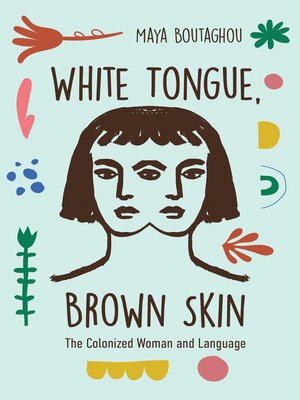
Sign up to save your library
With an OverDrive account, you can save your favorite libraries for at-a-glance information about availability. Find out more about OverDrive accounts.
Find this title in Libby, the library reading app by OverDrive.



Search for a digital library with this title
Title found at these libraries:
| Library Name | Distance |
|---|---|
| Loading... |
Examines the effect of prescribed multilingualism as expressed by women writers in colonial contexts
What does it mean to be an heir, as a woman writer, to colonial and postcolonial cultures in which European language has become so thoroughly ingrained? Examining women writers from India (Toru Dutt), Egypt (Mayy Ziyadah), Algeria (Assia Djebar), and Mauritius (Ananda Devi), White Tongue, Brown Skin sheds light on the essential double nature of the colonial experience.
Maya Boutaghou's latest book—her first in English—treats colonialism as analogous to a disease, manifesting itself in symptoms of multilingualism and cultural pluralism. Boutaghou shows how violently imposed multilingualism engenders in the mind of the colonized subject a state of permanent self-translation between two or more languages with unequal political and emotional power. They must endure a plural perception of the self, defined by the restless movement of self-translation, which becomes reflected in a literary dynamic frequently overlooked or misunderstood by previous scholarship.
Although the object is philosophical, this book is also deeply rooted in history. Understanding postcolonialism from below, as Boutaghou demonstrates, starts with an approach based on close readings in specific historical contexts.
What does it mean to be an heir, as a woman writer, to colonial and postcolonial cultures in which European language has become so thoroughly ingrained? Examining women writers from India (Toru Dutt), Egypt (Mayy Ziyadah), Algeria (Assia Djebar), and Mauritius (Ananda Devi), White Tongue, Brown Skin sheds light on the essential double nature of the colonial experience.
Maya Boutaghou's latest book—her first in English—treats colonialism as analogous to a disease, manifesting itself in symptoms of multilingualism and cultural pluralism. Boutaghou shows how violently imposed multilingualism engenders in the mind of the colonized subject a state of permanent self-translation between two or more languages with unequal political and emotional power. They must endure a plural perception of the self, defined by the restless movement of self-translation, which becomes reflected in a literary dynamic frequently overlooked or misunderstood by previous scholarship.
Although the object is philosophical, this book is also deeply rooted in history. Understanding postcolonialism from below, as Boutaghou demonstrates, starts with an approach based on close readings in specific historical contexts.







